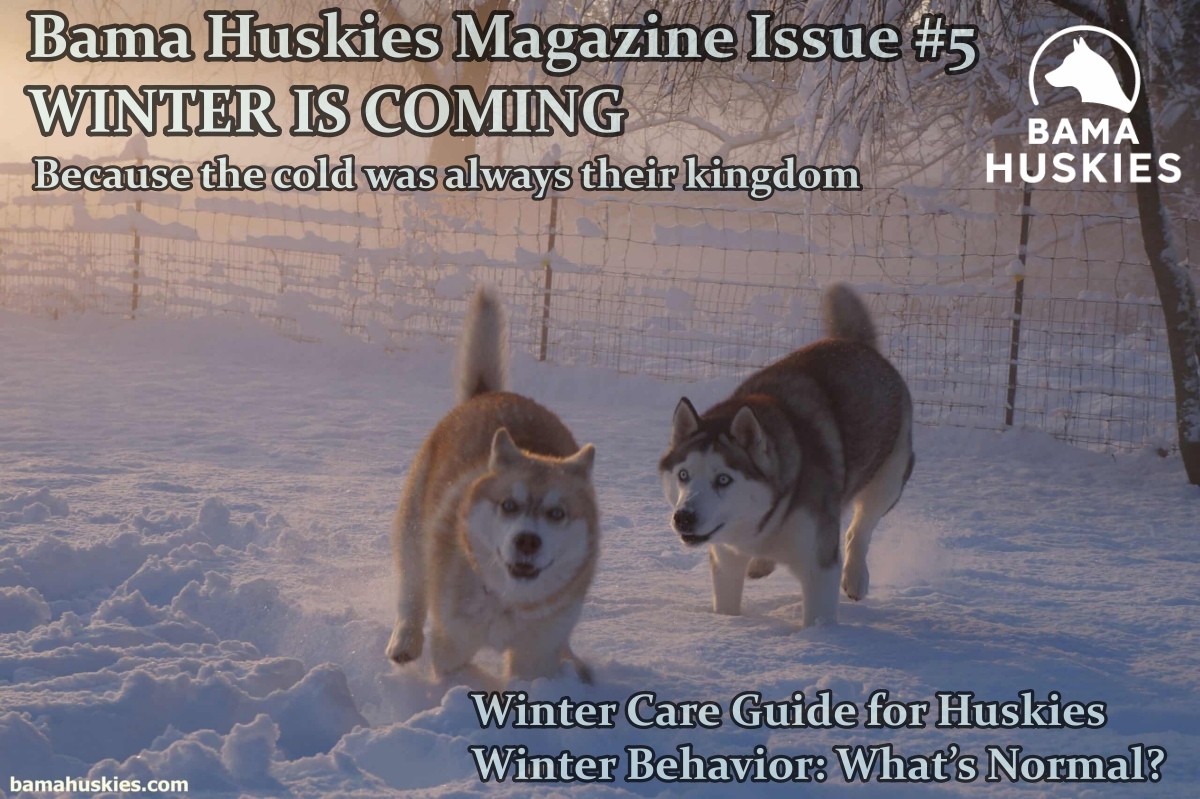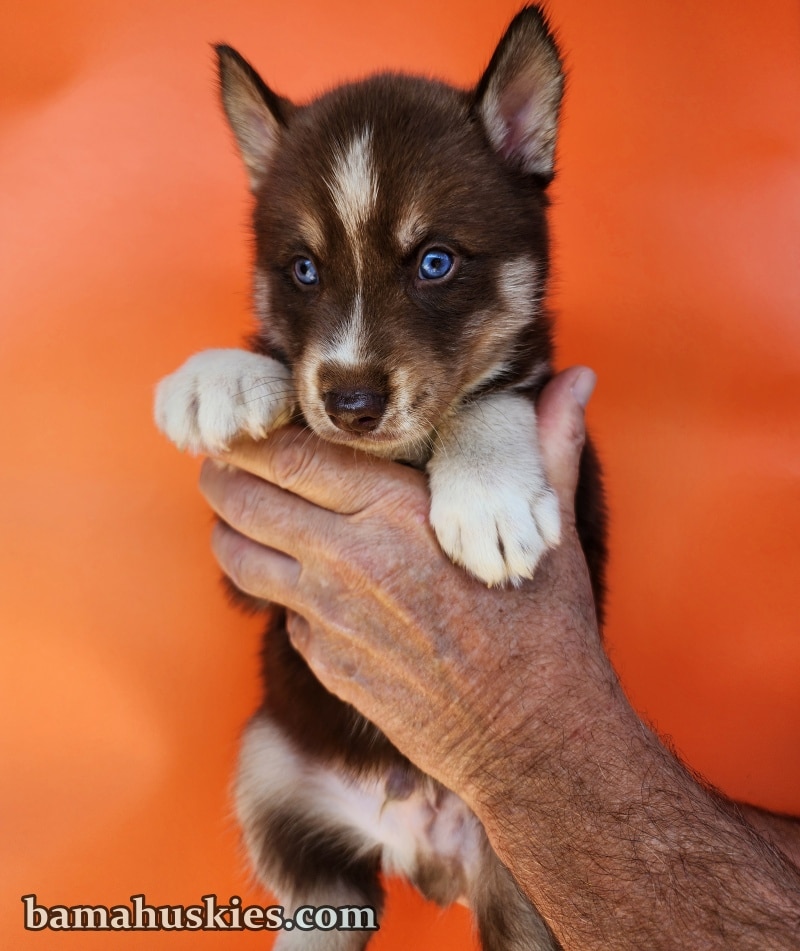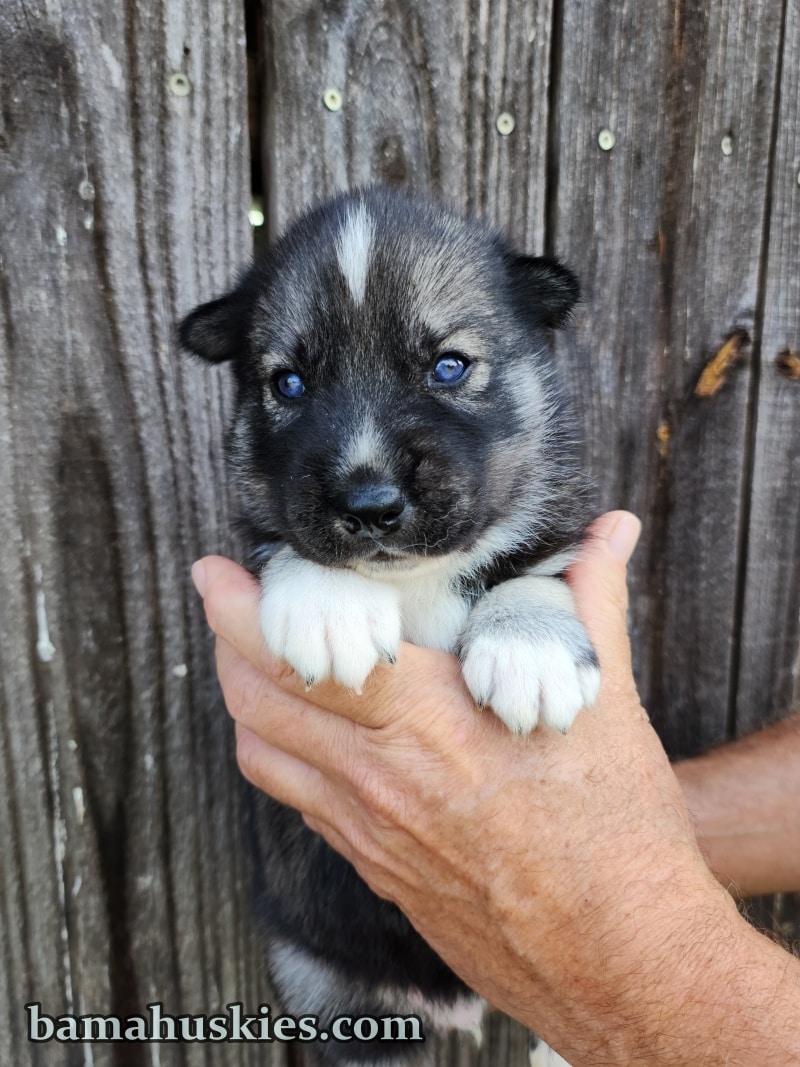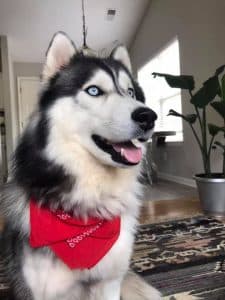 The Siberian Husky and humans share a special bond and the breed absolutely loves the company of humans. This is reflected in their behavior; it is kind and playful with everyone. Energetic, this breed is endowed with great endurance and has a vital need to run. It needs vigorous exercise in order to blossom and be happy. Otherwise, it can adopt a destructive behavior. Some do while others don’t.
The Siberian Husky and humans share a special bond and the breed absolutely loves the company of humans. This is reflected in their behavior; it is kind and playful with everyone. Energetic, this breed is endowed with great endurance and has a vital need to run. It needs vigorous exercise in order to blossom and be happy. Otherwise, it can adopt a destructive behavior. Some do while others don’t.
Food of the Siberian Husky
The Siberian Husky is a little eater for its size. Since this breed is prone to have a sensitive stomach, it is necessary to avoid changing it’s food back and fourth. Just stick to one brand of dog food. We use Pro Plan EN here at our kennels. They can easily become obese if they are overfed or from lack of exercise. We recommend feeding cooked sweet potatoes as snacks. They are healthy and good for their stomach. We just micro wave them until they are done. Then cut them in slices and feed once cooled off. Your husky will love them.
In hot weather, the Siberian Husky tends to eat less. A rest period before and after each meal is a good ideal to avoid stomach upset.
Please note:
The amount of food you should feed a Siberian Husky depends on its weight, age, health, and level of physical activity. There is not a one size fits all amount of food to feed your husky. You start out feeding the recommended amount and if it loses weight you increase it, or if he starts gaining too much weight you decrease it. We usually recommend starting our 8 week old husky puppies with about a cup 2 times per day.
Behavior and character traits of the Siberian Husky
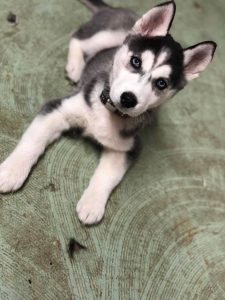 The Siberian Husky is overall a happy, sweet, intelligent and loyal dog. They love their family and consider them “its pack”. Left alone for long periods, it tends to howl (like a wolf) rather than bark.
The Siberian Husky is overall a happy, sweet, intelligent and loyal dog. They love their family and consider them “its pack”. Left alone for long periods, it tends to howl (like a wolf) rather than bark.
The Siberian Husky is friendly to everyone, both strangers and other dogs. Its predatory instinct, however, pushes it to pursue cats that have not been raised with them. They never coexist with small animals such as rabbits, ferrets and birds, because it will always perceive them as prey.
They love to runaway due to their natural tendency to always be on the move. It is important that you keep your backyard well-fenced. Also understand that a husky loves to dig holes. Some times it’s digging up grub worms to eat while other times it’s just a fun activity. If you are in love with your lawn you won’t be happy with a husky. Not all huskies dig but most do. The training of the Siberian Husky can be a challenge because it is independent by nature. Nothing we tell you will be a one size fits all.
How you train a Husky is important
Although it is intelligent and understands orders, it does not like obeying blindly. Thus, it needs an authoritarian master who knows how to impose himself as the leader of the pack. The training must be firm, but soft, and must absolutely be done at a young age for the best outcomes. Positive reinforcement is the best way to train a Siberian husky. They are food driven and you can use this to your advantage to train your husky. If you scream and yell at your husky it will see you as unstable and become fearful of you. This will prevent you from being able to train it. A dog that fears you will not take orders from you. It will look to get away from you. A dog will not follow an unstable leader. Let me repeat that! A husky will not follow a crazed maniac. This isn’t your Lab or German Shepherd. It takes a much different approach.
The Siberian Husky is agile, athletic, sporty, and loves to jump everywhere. It enjoys vigorous outdoor exercise, especially in cold climates. To fulfill its physical needs, it is essential to practice every day a stimulating activity: jogging, walking, hiking, ball games, playing fetch, Frisbee, etc. Running is vital and a simple walk around the block will not be suffice for some huskies.
They must always be secured on a leash, for if anything catches his attention, they will run after it. Although they can be trained off leash it will still be a risk. They like to work and feel useful; if it is possible, make them pull a bike or skateboard with you as the passenger once they are 15 months or older but not before. Don’t just hand them their snacks, make them work for them by chasing them down. We work our huskies every day. They chase down treats to get exercise. They are happy and settled after each session.
Warning: If it does not move enough and if it is not stimulated enough mentally, the Siberian Husky can become extremely destructive. In summer, it tends to dig a lot in the soil to look for cool dirt.
Grooming the Siberian Husky
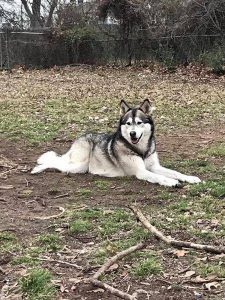 The thick fur of the Siberian Husky must be brushed twice a week. In times of blowing their coats, daily brushing is recommended to eliminate the undercoat hair.
The thick fur of the Siberian Husky must be brushed twice a week. In times of blowing their coats, daily brushing is recommended to eliminate the undercoat hair.
The Siberian Husky blows it’s coat abundantly twice a year; it changes its fur completely, which can last beyond three weeks. The rest of the time, this breed loses relatively few hairs. If hair is a bad turn off then this may not be the breed for you. It can be piles of hair left on the ground when you brush out a husky that is blowing it’s coat. We recommend a simple undercoat rake to get the job done.
Glamorous, the Husky is like a cat and emits no smell. In addition, its coat has a self-cleaning ability. A few baths a year is enough. When it goes outside and gets wet from the rain or pool it will not have a wet dog smell. This is definitely a positive for this breed. You can freshen the coat of your husky between baths by diluting mint mouthwash with water by 50% and putting it in a spritz bottle. Spray your husky and towel dry. This will leave your husky’s coat fresh smelling and clean.
Warning: Parasites (ticks, fleas) prefer the type of hair of the Husky and can infest their coats easily. Keep them on a flea and tick preventative.
Here are a few pros and cons of owning a husky
- Fabulous pet dog for the family
- Friendly and sociable with everyone (strangers, other dogs)
- Excellent jogging companion
- An effective working dog
Cons
- Needs a lot of physical activity and mental stimulation every day
- Destructive behavior if left alone too often or not exercised enough
- Independent and stubborn, absolutely needs an early education
- Runaway (hunter in the soul)

